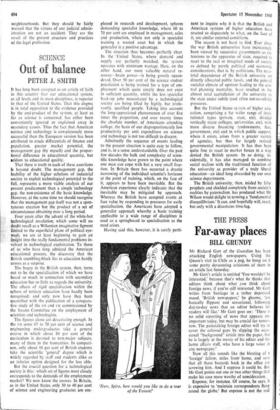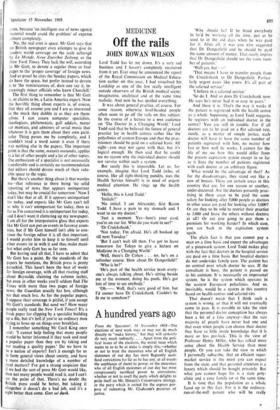Far-away places
THE PRESS BILL GRUNDY
Mr Richard Gott of the Guardian has been attacking English newspapers. Using the Queen's visit to Chile as a peg, he hung on it some pretty devastating criticism's of them in an article last Saturday.
Mr Gott's article 'is entitled 'You wouldn't be interested,' because that's what 'he thinks that editors think about what you think about foreign news, if you're still interested. Mr •Gott writes from Santiago in a 'rather depressed mood. 'British newspapers,' he glooms, 'are basically flippant and sensational, following day-to-day news that an editor believes his readers will like.' Mr Gott goes on : 'There is no solid reporting of news that appears un- important today, but may be crucial for tomor- row. The painstaking foreign editor will try to cover the colossal gaps by slipping the occa- sional "background" article into the paper, but he is largely at the mercy of his editor and the home affairs staff, who have a large voice in any newspaper.'
Now all this sounds like the bleating of a 'foreign' fellow, miles from' home, and sure that all those bastards back in the office are screwing him. And I suppose it could be. But Mr Gott points out one or two other things that make his case more worthy of consideration. Expense, for instance. Of course, he says, it is expensive to 'maintain correspondents flung round the globe.' But expense is not the real
crux, because 'an intelligent use of news agency material would avoid the problem' of expense almost completely.
No, the real crux is space. Mr Gott says that no British newspaper even attempts to give its readers world coverage on the scale achievgd by Le Monde, Neue Zuercher Zeitung, or the New York Times. They lack the will, according to Mr Gott, to devote a regular three or four pages to the 'proper coverage' of foreign news. And as proof he cites the Sunday papers, which do, have the space, but prefer instead to devote it to 'the reminiscences of, dare one say it, in- creasingly minor officials who knew Churchill.'
The first thing to remember is that Mr Gott is, or claims to be, a Latin America expert. Now the horrible thing about experts is, of course, that they all assume you and I are as interested in the muck they dabble in as they are them- selves. I can assure computer specialists, theologians, philumenists, golf addicts, motor car maniacs, and admirers of serial music that whatever it is gets them about their own parti- cular Thing passes me by completely, and I wouldn't read a word aoout it even if there was nothing else in the papers. The important point is that the same, 'nitwits mutandis, applies to a lot of other people and a lot, of other topics. The enthusiasm of a specialist is not necessarily transferable and is certainly no recommendation that editors should devote much of their valu- able space to the topic.
But there's another thing about it that worries me—that reference to there being `no solid reporting of news that appears unimportant today, but may be crucial for tomorrow.' Now I don't like that at all. If it appears unimportant for today, and experts like Mr Gott can't tell us why it isn't unimportant for today, then as far as I'm concerned it is unimportant for today, and I don't want it cluttering up my newspaper. I am all for the interpretative gloss that experts like Mr Gott can put on events in faraway coun- tries, but if Mr Gott himself isn't able to con- vince the foreign editor it is all that important, I would prefer him to keep it to himself until other events tie in with it and thus make mani- fest what only Gott has so far seen.
But having said all that, I have to admit that Mr Gott has a point. By the standards of the papers he mentions, the British press is pretty parochial. This hasn't been the best of weeks for foreign coverage, with all that riveting stuff about Reynolds claiming the column inches, but even in other weeks you'll seldom find The Times with more than two pages of foreign news; the Guardian usually has less, although not that much less. As for the popular papers, I suppose their coverage is pitiful, if you accept Mr Gott's standards. But need we? How many people really read the New York Times? It's a freak paper for clipping by a specialist building up a file, but it's hell if you're an ordinary man trying to bone up on things over breakfast.
I remember something Mr Cecil King once said: 'I cannot help feeling that many people would' be better informed if they took and read a popular paper than they are by taking and not reading a quality paper.' Do we have to be a nation of experts? Isn't it enough for us Ni form general views about society, and have a more detailed knowledge of a number of local matters? I've got a strong suspicion that if we had the sort of press Mr Gott would like, then not many people would read it, and I can't see the point of that. There's no doubt the British press could be better, but taking it altogether it doesn't do a bad job, and it's a sight better than some. Gott sei dank.







































 Previous page
Previous page